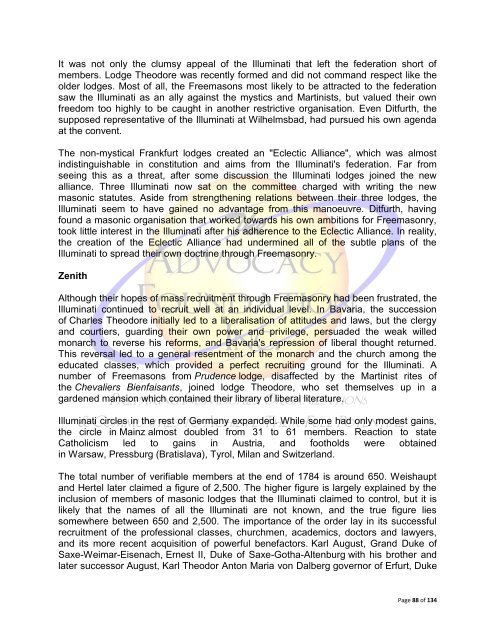Cultural Transformation
Cultural Transformation
Cultural Transformation
You also want an ePaper? Increase the reach of your titles
YUMPU automatically turns print PDFs into web optimized ePapers that Google loves.
It was not only the clumsy appeal of the Illuminati that left the federation short of<br />
members. Lodge Theodore was recently formed and did not command respect like the<br />
older lodges. Most of all, the Freemasons most likely to be attracted to the federation<br />
saw the Illuminati as an ally against the mystics and Martinists, but valued their own<br />
freedom too highly to be caught in another restrictive organisation. Even Ditfurth, the<br />
supposed representative of the Illuminati at Wilhelmsbad, had pursued his own agenda<br />
at the convent.<br />
The non-mystical Frankfurt lodges created an "Eclectic Alliance", which was almost<br />
indistinguishable in constitution and aims from the Illuminati's federation. Far from<br />
seeing this as a threat, after some discussion the Illuminati lodges joined the new<br />
alliance. Three Illuminati now sat on the committee charged with writing the new<br />
masonic statutes. Aside from strengthening relations between their three lodges, the<br />
Illuminati seem to have gained no advantage from this manoeuvre. Ditfurth, having<br />
found a masonic organisation that worked towards his own ambitions for Freemasonry,<br />
took little interest in the Illuminati after his adherence to the Eclectic Alliance. In reality,<br />
the creation of the Eclectic Alliance had undermined all of the subtle plans of the<br />
Illuminati to spread their own doctrine through Freemasonry.<br />
Zenith<br />
Although their hopes of mass recruitment through Freemasonry had been frustrated, the<br />
Illuminati continued to recruit well at an individual level. In Bavaria, the succession<br />
of Charles Theodore initially led to a liberalisation of attitudes and laws, but the clergy<br />
and courtiers, guarding their own power and privilege, persuaded the weak willed<br />
monarch to reverse his reforms, and Bavaria's repression of liberal thought returned.<br />
This reversal led to a general resentment of the monarch and the church among the<br />
educated classes, which provided a perfect recruiting ground for the Illuminati. A<br />
number of Freemasons from Prudence lodge, disaffected by the Martinist rites of<br />
the Chevaliers Bienfaisants, joined lodge Theodore, who set themselves up in a<br />
gardened mansion which contained their library of liberal literature.<br />
Illuminati circles in the rest of Germany expanded. While some had only modest gains,<br />
the circle in Mainz almost doubled from 31 to 61 members. Reaction to state<br />
Catholicism led to gains in Austria, and footholds were obtained<br />
in Warsaw, Pressburg (Bratislava), Tyrol, Milan and Switzerland.<br />
The total number of verifiable members at the end of 1784 is around 650. Weishaupt<br />
and Hertel later claimed a figure of 2,500. The higher figure is largely explained by the<br />
inclusion of members of masonic lodges that the Illuminati claimed to control, but it is<br />
likely that the names of all the Illuminati are not known, and the true figure lies<br />
somewhere between 650 and 2,500. The importance of the order lay in its successful<br />
recruitment of the professional classes, churchmen, academics, doctors and lawyers,<br />
and its more recent acquisition of powerful benefactors. Karl August, Grand Duke of<br />
Saxe-Weimar-Eisenach, Ernest II, Duke of Saxe-Gotha-Altenburg with his brother and<br />
later successor August, Karl Theodor Anton Maria von Dalberg governor of Erfurt, Duke<br />
Page 88 of 134

















